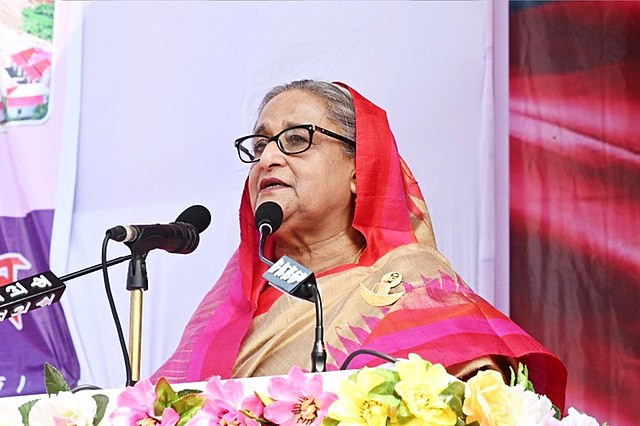Sheikh Hasina, the Prime Minister of Bangladesh, resigned and fled the country on Monday amidst escalating anti-government protests that have left nearly 100 people dead in the capital, Dhaka. Sources confirmed that Hasina is en route to London, marking a significant shift in Bangladesh's political landscape.
The departure comes after weeks of intense demonstrations led by the Anti-Discrimination Students' Movement, which culminated in protesters storming the Gono Bhaban, the official residence of the Prime Minister. Media outlet ProthomAlo reported that Hasina's military helicopter took off from Bangabhaban at 2:30 PM local time, accompanied by her younger sister, Sheikh Rehana. The helicopter's destination was West Bengal, India, from where Hasina is expected to continue to London.
Protesters breached the gates of Gono Bhaban around 3 PM, a move that underscored the escalating unrest. Thousands of demonstrators participated in the "March to Dhaka" program, moving towards Farmgate from the Mirpur 10 roundabout, demanding Hasina's resignation. The protests have been fueled by widespread dissatisfaction with the government's quota system, which reserves civil service jobs for specific groups, including descendants of 1971 war veterans.
The unrest has intensified over the past month, with violent clashes between protesters and pro-government forces leading to significant casualties. The Daily Star reported that 93 people were killed on Sunday alone, with many more injured by gunfire. The violence has prompted the government to shut down public and private offices, including banks, for three days.
In an attempt to quell the situation, Army Chief General Waker-Uz-Zaman was scheduled to address the nation but was reportedly pushed back by the Inter Services Public Relations (ISPR), as cited by The Daily Star. Meanwhile, the military facilitated Hasina's safe passage out of the country, an act seen as a necessary move to prevent further escalation.
Reports indicate that Sheikh Hasina's departure was met with mixed reactions. While some expressed relief and hope for a new beginning, others demanded justice for the lives lost during the protests. Hakima Sultana, a day laborer, voiced her anger, saying, "Why did they let her flee? She killed our brothers, beat our sisters. She should have hanged to death."
The protests, initially sparked by the students' demands to end the quota system for government jobs, have evolved into a broader movement against Hasina's administration, accusing it of autocratic governance. The Prime Minister's offer to meet with the protesting students at Gono Bhaban to resolve the issue was rejected, leading to a full-blown crisis.
The army has announced the formation of an interim government to ensure stability and peace. In a televised address, General Zaman stated, "We will not achieve anything else through fighting and violence. I urge you all to stop all conflicts and destruction." He also promised thorough investigations into every death caused by the recent violence.
The political upheaval has significant implications for Bangladesh, a nation of 170 million people. Hasina, who has been a dominant figure in Bangladeshi politics for decades, is the daughter of the country's first president and has served as Prime Minister multiple times. Her administration has faced criticism for stifling opposition, suppressing press freedom, and alleged vote-rigging.
The allocation of government jobs, a sensitive issue in Bangladesh, exacerbated the unrest. A controversial policy reintroduced by Hasina reserved 30% of government jobs for descendants of freedom fighters, which had been abolished in 2018 after violent protests. This policy's reinstatement triggered the latest wave of demonstrations, leading to Hasina's resignation.




